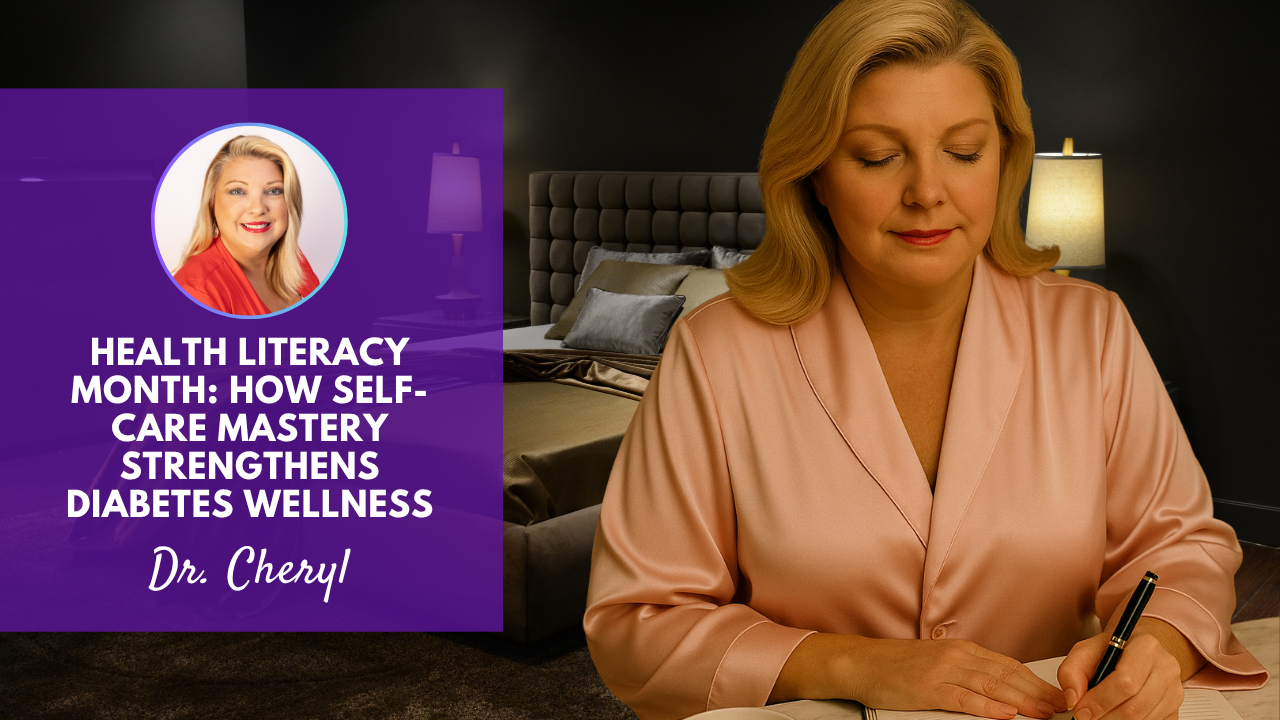
Health Literacy Month: How Self-Care Mastery Strengthens Diabetes Wellness
October is Health Literacy Month, a time to recognize how understanding and applying health information improves everyday decisions. This week, we're focusing on self-care mastery. While mindset, meals, and movement each play an important role, it's often self-care that ties everything together. Self-care mastery means developing the knowledge and skills to manage stress, improve sleep, and create balance in your daily routines.
For people living with diabetes, is a necessity that directly affects blood sugar stability, energy levels, and long-term health. Yet many people overlook it because it feels intangible compared to meals or exercise. Health literacy helps bridge that gap. When you understand how stress hormones affect blood sugar, or why sleep plays such a critical role in metabolism, self-care stops feeling optional and starts becoming essential.
Why Self-Care Mastery Matters in Diabetes
Self-care mastery means knowing how to recognize signs of stress, fatigue, or burnout and using practical strategies to respond. When stress goes unmanaged, cortisol levels rise and blood sugar follows. When sleep is neglected, insulin sensitivity decreases and cravings increase. These connections aren't abstract. They're grounded in science.
According to the World Health Organization, lifestyle management that includes self-care practices is essential in preventing and managing diabetes complications. The American Diabetes Association also emphasizes the importance of mental well-being and stress management in successful diabetes care. Health literacy helps you connect the dots so that you can prioritize rest, balance, and resilience just as much as food and exercise.
How to Use Health Literacy for Better Stress Management
Stress management is more than finding time to relax. Health literacy allows you to identify which techniques truly work for you. For example, deep breathing exercises, meditation, or short breaks during a busy workday can lower cortisol and steady your blood sugar. When you understand why these practices are effective, you're more likely to use them consistently.
For more ways to strengthen your mindset around stress, revisit our blog, Building Diabetes Confidence: Why Health Literacy Starts with Your Mindset. It pairs perfectly with this week’s focus, showing how mental clarity and stress awareness combine to protect your health.
The Role of Sleep in Diabetes Self-Care
Sleep is one of the most underestimated forms of self-care. Poor sleep affects hormones that regulate hunger and blood sugar. By learning how sleep patterns interact with your metabolism, you can make informed choices to protect both rest and blood sugar.
Creating a bedtime routine, limiting screen time, and maintaining a consistent sleep schedule are all examples of health literacy in action.
For practical nutrition ideas that support restful nights, explore our blog Fuel Your Day: The Smart Snack That Keeps You Energized and Balanced. Balanced meals and snacks can play an important role in supporting quality sleep and stable blood sugar.
Simple Self-Care Practices for Busy Lives
Even with a full calendar, you can add self-care practices that support blood sugar control:
- Five minutes of morning breathing exercises to begin the day with calm.
- Short walking breaks between meetings to lower stress and boost circulation.
- Preparing a calming herbal tea in the evening to signal your body for rest.
- Keeping a gratitude journal to focus on positives and reduce mental strain.
These steps don't require large amounts of time. When done consistently, they build resilience and confidence.
How to Practice Self-Care for Better Blood Sugar
-
Notice signs of stress or fatigue.
-
Choose a calming technique such as deep breathing.
-
Create a bedtime routine for consistent sleep.
-
Take short breaks during the day to reset.
-
Keep track of what works best for you.
This simple process helps you turn health literacy into daily self-care that protects both your mind and your blood sugar.
Frequently Asked Questions
Why is self-care important for diabetes?
Self-care helps manage stress, improve sleep, and maintain balance, all of which directly influence blood sugar control and overall health.
How does stress affect blood sugar?
Stress increases cortisol, which raises blood sugar levels. Managing stress through techniques like breathing exercises or meditation helps keep levels steady.
What role does sleep play in diabetes management?
Poor sleep reduces insulin sensitivity and increases cravings. Quality sleep supports better blood sugar balance and overall resilience.
Build Clarity and Confidence in Your Diabetes Journey
Self-care mastery is about using knowledge and daily practices to protect your blood sugar and strengthen your overall health. With strong health literacy, you can recognize what your body needs and respond with confidence.
Let this week be a reminder that caring for yourself is the foundation of lasting wellness. Even small steps like a moment of calm breathing, a good night’s sleep, or a pause to reset your mindset, add up to big changes over time.
When you're ready to take your next step, book a complimentary Diabetes Wellness Connection Call. Together we can uncover your goals, discuss your challenges, and create a plan that helps you thrive in every area of life.
ABOUT THE AUTHOR

Dr. Cheryl
Dr. Ac., C.H., RDH
Dr. Holistic Studies, Dr. Acupuncture
Diabetes Wellness Strategist & Coach
Creator & CEO of Holistic Diabetes Solutions
8 X International Best-Selling Author
As a woman living with diabetes for over 30 years, Dr. Cheryl understands the journey firsthand. When she was diagnosed, she received the same outdated advice her grandmother was given for over four decades, who relied primarily on medication, suffered from deteriorating health and eventually lost her life to diabetes. Fueled by this experience, Dr. Cheryl was compelled to seek a better way. Through countless research studies and trials, she developed the winning holistic approach: the Diabetes Success System which merges traditional wisdom with today’s best holistic self-care practices. It has revolutionized diabetes management by providing a trusted way to maintain consistent and predictable healthy blood sugar levels.
_______________________
PROFESSIONAL DISCLAIMER
The material and content contained in this platform is for overall general diabetes health and education information only. It is not intended to constitute medical advice or to be a substitution for professional medical recommendations, diagnosis or treatment. All specific medical questions or changes you make to your medication and/or lifestyle should be discussed and addressed with your primary healthcare provider. Having the right mindset, doing the right movements at the right times of day, and eating foods that help keep blood sugar, insulin, and inflammation manageable can dramatically reduce your risk of the all-too-common complications of Diabetes, increase your energy levels and have you feeling your best every day.






